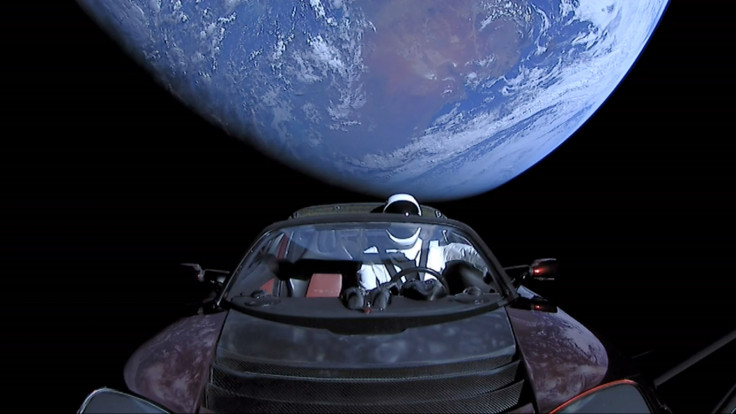Can Elon Musk's 'spacefaring' Roadster come back? Scientists see a possibility of collision with Earth
The car has been marked as a 'Near Earth Object' by Nasa and is now moving towards the asteroid belt.

Elon Musk shot his personal Tesla Roadster into space with the launch of Falcon Heavy. The vehicle is now soaring deep into the cosmos, but can it come back?
Yes, says a group of University of Toronto scientists who studied the vehicle's orbital trajectory and found that it is on a collision course with Earth or Venus.
But do not worry, the group says the crash won't take place anytime time soon, if it happens at all.
"It [the car] will likely end up colliding with Earth or Venus, but there's no need to panic since the probability of that happening even within the next million years is very small," said lead author Hanno Rein.
Though SpaceX's initial target was a Mars-bound orbit, the company soon realised it had overshot the vehicle, which is now moving towards the asteroid belt. The vehicle is floating in an elliptical path and will fly by Earth closely within a century or so, just like asteroids.
As space is unpredictable, the orbital path of the car can change due to the gravitational pull of Earth and its neighbours and a number of uncertainties.
However, Reins and his colleagues managed to estimate where the vehicle could end up eventually. The group ran a series of computer simulations and found there is a 6% chance that the vehicle will crash into Earth over the next million years or so and that there is a 2.5% possibility of collision with Venus. The work has been published on the academic preprint server arXiv.
"Over time the orbit will undergo what's called a random walk, similar to the fluctuations we see in the stock market that will allow it to wander the inner solar system," said study co-author Dan Tamayo. For Earth, the collision chances will go up to 10% if Roadster manages to survive intense solar radiation for three million years, Popular Mechanics reported.
"Although we are not able to tell on which planet the car will ultimately end up, we're comfortable saying it won't survive in space for more than a few tens of millions of years," Tamayo added.
While one million years is a very long time, if we assume the possibility that Roadster will crash into our planet, there is still nothing to worry. It won't be a threat to human populations because most of the vehicle would burn soon after entering our atmosphere, making up another shooting star for viewers to enjoy.
Nasa has classified Musk's Tesla as a "Near Earth Object" and is tracking it on a regular basis. You can even check its location on whereisroadster.com.
Follow the orbit of @elonmusk 's Roadster in this animated Plotly graph by @whereisroadster https://t.co/4qnALXleSy
— plotly (@plotlygraphs) February 17, 2018
🚗 💫 pic.twitter.com/P0PCl7ejih





















